#pcsc bill
Text
Now that the dust has settled a little bit on the arrests around the coronation, I want to talk a little bit about what this means for the future of protest and policing in England and Wales.
Firstly, I want to caveat this by saying the police have always hated protests. Getting arrested at a protest has always been a risk. Getting beaten up by the police as they try to provoke violence has always been a risk. At a recent anti-fascist counter protest I attended, two arrests were made. One of these later turned out to be “mistaken identity” (neither person was charged), but this is what we’ve always been dealing with.
However, I do think this idea of arrest for conspiracy to cause a public nuisance is dangerous. It’s essentially a thought crime. We think you might do something criminal, therefore we are going to arrest you. It has the power to significantly disrupt all sorts of actions, and we do need to be wary of it. The fact you can be arrested whilst walking to a protest, carrying a sign or a megaphone, and that this arrest *may* be legal (I hope some of those involved today try to sue for wrongful arrest, but we will see) means potentially some actions will never get started, and that is not good for the future of protest in this country.
I would never blame someone for their arrest- their arrest is the fault of the police and the police alone. That said, we know Republic were talking to cops about their plans. This did not protect them, and may have made it easier for the police to locate and arrest them. I think, on here, we all know talking to cops is a bad idea, but let’s say it again, louder for those at the back “DON’T TALK TO COPS”.
Now, the police say that the coronation is a once in a lifetime event, hence their response- blah blah- the police hate protest. If they get away with this, they will do it again, they will push things as far as they can to try and shut down protest they don’t agree with. This means we do need to be careful around OpSec etc. I also know people who don’t understand why e.g. antifa groups conceal their identity. But this is yet another good reason to do so. Black bloc, grey bloc, staying anonymous online, secure communications all of this is increasingly important- whilst also obviously trying to ensure good turn outs.
If the police are going to arrest you for walking to a protest with a megaphone, then what’s stopping us from being more violent/aggressive in our protest? I know some people are ideologically wedded to peaceful protest, but these actions are now potentially illegal too. So what’s stopping us? What is actually holding us back? If holding a sign is too much for them, if that’s on the level of smashing a window now, then what’s to stop us smashing windows?
Finally, I want to talk to the organisers of peaceful protests about police monitoring and post arrest support. In the past, many groups have felt this wasn’t needed. But now, it could be. If you’re organizing a protest of any kind, I strongly encourage you to get in touch with the Green and Black Cross for advice, and to arrange legal observers. Print out bust cards and distribute them. I’d also strongly encourage you to set up some post arrest support. It’s far better to have it, and not need it, than need it and not have it. If you’re concerned about police behaviour, you could also contact NetPol for advice.
Green and Black Cross: https://greenandblackcross.org/
NetPol: https://netpol.org/
#uk politics#coronation#protest#right to protest#fuck the police#fuck the king#not my king#pcsc bill#kill the bill#peaceful protest
1K notes
·
View notes
Note
to add a key extra quote from the PDF i linked, since it was published before the PCSC bill was made law -- "The police bill threatens to elevate the UK to Stage 8: Persecution". the bill is law now. as a Gypsy, i'm in a country where genocide watch itself considers it STAGE EIGHT of the TEN genocide stages. but sure. only the middle eastern races are bad. :')
that is... horrifying in so many ways. thank you for sending me the genocide watch page too, it's much appreciated, i honestly didn't even know it existed.
i also want to say that i know we come here mostly to enjoy a break from the, as above ilustrated, horrifyingly scary state of the world right now, and i will also obviously be back to posting how much i wanna bang carlos by proxy of charles or sth, but that ask pissed me off something unreal, and i just couldn't let it go, because i feel a lot of these things need to be said and acknowledged. even on the rpf website.
i am sending you all the love and hugs. thank you for the information again <3
2 notes
·
View notes
Text
I’m not so much angry with Diane Abbott as I am tired. Many, many times that I felt she ought to know better even in terms of what you say and especially write. Jo Maugham is saying that the letter was a draft letter which begs the question: why and how did a draft letter end up getting published by the Guardian?
Diane, just make your point about the “hierarchy of racism” in the Labour Party. It would have been understood by everyone, if not accepted. Don’t try to set up a “hierarchy of oppression”. It’s anti-solidaristic and diverts away from the explictly and shameless racism from the Sunak government. There are refugees on boats struggling to arrive here, and even those who didn’t come through boats have their status of residing here on a conditional basis. The PCSC Bill is going to target those to resist this, and furthermore - its going to target GRT people anyway for their way of life. Instead, we have to deal with this shit which more to do with some journalist who’s annoyed you than addressing racism.
#labour party#diane abbott#racism#i'm so tired maaaaan#best believe no one will refer to forde report again smh
2 notes
·
View notes
Text
Now having some followers, I'm going to ask again: (also feel free to reblog and add stuff, including where you're from, how old ish you are etc) - I'm trying to gauge basically "What does tumblr know about?"
- Have you heard of the Tinker Experiment (and what do those nouns mean to you?) (Context clues: Scotland, 20th Century, Quarriers, Barnardos)
- What do you know about the English "Police, Crime, Courts and Sentencing Act"? (Context clues: PCSC Bill, recent, land justice)
0 notes
Text
Research
What are the Kill the Bill protests about?
“Kill the Bill” is an old protest slogan used around the world, but the recent UK protests started after the PCSC Bill passed its second reading in Parliament, meaning MPs had voted in favour and it would go to the committee stage for further scrutiny.
The protesters are angry that the Bill would allow police to impose “conditions” — widely seen to mean restrictions or outright bans — on protests if their actions cause “serious annoyance” to the surrounding community, organisations and businesses.
https://www.bigissue.com/news/activism/what-are-the-kill-the-bill-protests-police-crime-sentencing-courts-bill/
youtube
The Selma to Montgomery march was part of a series of civil rights protests that occurred in 1965 in Alabama, a Southern state with deeply entrenched racist policies. In March of that year, in an effort to register Black voters in the South, protesters marching the 54-mile route from Selma to the state capital of Montgomery were confronted with deadly violence from local authorities and white vigilante groups. As the world watched, the protesters—under the protection of federalized National Guard troops—finally achieved their goal, walking around the clock for three days to reach Montgomery, Alabama. The historic march, and Martin Luther King Jr.’s participation in it, raised awareness of the difficulties faced by Black voters, and the need for a national Voting Rights Act.
https://www.theguardian.com/world/2021/nov/02/polish-activists-protest-after-first-death-in-wake-of-stricter-abortion-law
A Polish hospital has said that doctors and midwives did everything they could to save the lives of a pregnant woman and her foetus in a case that has put the spotlight on the country’s new stricter abortion law.
The 30-year-old woman died of septic shock in her 22nd week of pregnancy. Doctors did not perform an abortion, even though her foetus was lacking amniotic fluid, according to a lawyer for the family.
Reproductive rights activists say she is the first person to die as a result of a recent restriction of Poland’s abortion law.
Before the new restriction, women in Poland could have abortions only in three cases: if the pregnancy resulted from a crime such as rape, if the woman’s life was at risk, or in the case of severe foetal deformities. The constitutional tribunal, which is influenced by Poland’s conservative ruling party, ruled last year that abortions for congenital defects were not constitutional.
Women’s rights activists say doctors in Poland now wait for a foetus with no chance of survival to die in the womb rather than perform an abortion.
Women’s rights activists and opposition MPs have accused the Polish government of abandoning victims of domestic violence as a bill that would in effect take the country out of a key international convention on violence against women moved through parliament.
A vote last week on its first reading prompted demonstrations around Warsaw, including at the parliament, constitutional court and education ministry. Activists fear that victims of domestic violence will be left with no support or protection.
The vote to send it for examination by parliamentary committees took place only days after Turkey, the first state to ratify the Istanbul convention, withdrew from it by presidential decree. No date for a second reading in Poland has yet been set.
“Withdrawal from the Istanbul convention would signal to the international community that Poland is moving away from the west, from democracy and human rights, and is instead going in the direction of Turkey and dictatorship,” said the opposition MP Barbara Nowacka, the leader of the centre-left Polish Initiative party.
The Istanbul convention aims to prevent domestic violence and other forms of violence against women. The legally binding treaty was signed by 34 European countries and came into effect in 2014.
Rightwing politicians in Poland and activists from Ordo Iuris, the ultraconservative legal group behind the bill, have argued that the convention promotes “gender ideology”. Proponents of the bill – named“Yes to family, no to gender” – want the Polish government to write its own anti-violence legislation that will “secure the rights of families”.
https://www.theguardian.com/world/2021/apr/07/poland-accused-of-abandoning-domestic-violence-victims
youtube
Why have railway workers been on strike?
The unions are in dispute with the government and rail companies about pay, job cuts and changes to terms and conditions.
Unions say any pay offer should reflect the rising cost of living. - currently above 10%.
But the rail industry is under pressure to save money, after the pandemic left a hole in its finances. Bosses say reforms need to be agreed, to afford pay increases and modernise the railway.
Network Rail is planning to cut 1,900 jobs as part of changes to the way its maintenance teams work - although it insists most of this could be achieved by people leaving voluntarily.
The RMT disagrees with some of the changes and wants a guarantee of no compulsory job losses.
youtube
The George Floyd protests were a series of both peaceful protests and riots against police brutality and racism that began in Minneapolis on May 26, 2020, and largely took place during 2020. The civil unrest and protests began as part of international reactions to the murder of George Floyd, a 46-year-old African American man who was murdered during an arrest after Derek Chauvin, a Minneapolis Police Department officer, knelt on Floyd's neck for 9 minutes and 29 seconds as three other officers looked on and prevented passers-by from intervening. Chauvin and the other three officers involved were later arrested. In April 2021, Chauvin was found guilty of second-degree unintentional murder, third-degree murder, and second-degree manslaughter. Chauvin was sentenced to 22.5 years in prison with possibility of supervised release after 15 years for second-degree murder in June 2021.
Never forget, the State and it’s police force hold a monopoly on violence
Remember that every time they say the word “riots” and “looting”
youtube
https://www.vox.com/recode/23145265/amazon-fired-chris-smalls-union-leader-alu-jeff-bezos-bernie-sanders-aoc-labor-movement-biden
A new type of labor leader
Smalls has been an effective leader in large part because of his authenticity, which stands in stark contrast to the often impersonal culture at Amazon’s warehouses, where management relies on metrics, software, and automated systems to oversee its workforce.
I first started talking to Smalls two years ago at the start of the Covid-19 pandemic, when he was still a process assistant — essentially, an assistant manager — at Amazon and began raising concerns that the company wasn’t doing enough, in his view, to protect his coworkers from exposure to the virus. At the time, Smalls told me he wasn’t interested in starting a union.
But in March 2020, only hours after Smalls organized a protest in his warehouse’s parking lot to demand Amazon provide safer working conditions, the company fired him for allegedly violating its quarantine policy (Smalls disputes this). His case drew widespread attention, particularly after a leaked internal memo revealed that Amazon’s top lawyer, David Zapolsky, called Smalls, a Black man, “not smart or articulate,” and that Amazon should strategically make him the “face of the entire union/organizing movement” so that it would fail. It didn’t fail lol.
Starbucks workers around the US are planning a three-day strike starting on Friday as part of their effort to unionize the coffee chain’s stores.
More than 1,000 baristas at 100 stores are planning to walk out, according to Starbucks Workers United, the labor group organizing the effort. The strike will be the longest in the year-old unionization campaign.
This is the second major strike in a month by Starbucks’ US workers. On 17 November, workers at 110 Starbucks stores held a one-day walkout. That effort coincided with Starbucks’ annual Red Cup Day, when the company gives reusable cups to customers who order a holiday drink.
More than 264 of Starbucks’ 9,000 company-run US stores have voted to unionize since late last year. Starbucks opposes the unionization effort, saying the company functions better when it works directly with employees. But the company said last month that it respects employees’ lawful right to protest.
youtube
https://cdnhistorybits.wordpress.com/2016/01/05/mens-fashion-during-and-after-the-french-revolution-1790-1810/
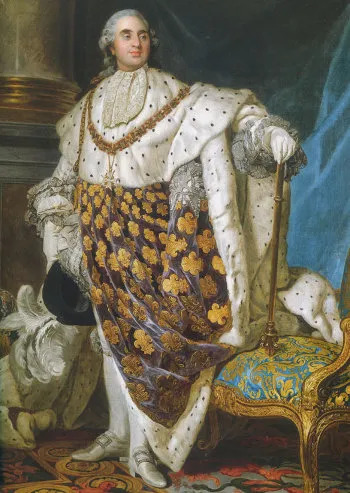
The French Revolution really brought about the old cliche “clothes make the man,” because fashion became a political statement. No matter how rich a guy was, he was dressing like a commoner; like a san-culottes. Part of this was to save his neck. Literally. The other part was that the spread of democratic ideals meant a shift away from aristocratic symbols, particularly clothes. Lace cuffs, knee breeches, ruffles, frills, frockcoats, lighter colors, high heels, big wigs, the flamboyant Macaroni style—all of this fell out of favor. In its place came the rise of darker clothes, ankle-length trousers, matching jackets, suits, and short, natural hair. If that sounds kinda like modern masculine wear that’s because it is. The French Revolution (in addition to the American Revolution) sparked that lasting change because they were the start of the slow process towards the democratization of Western society.
The long skirts of coats were cutaway in front, on the backside long tails remained. The top part of the coat did not change too much yet, however lapels did shrink a bit. Waistcoats (often double-breasted) with high collars were fashionable until around 1815. Wool and silk continued to be popular fabrics. Underneath shirts were still made of linen. Around their necks were either an attached collar or a cravat wrapped stylishly.
Perfect tailoring and the right cut replaced lace and embroidery as the way to distinguish quality and separated the wealthy from those who weren’t. Nevertheless, despite the anti-aristocratic trend when it came to formal dress men still preferred to wear coats with heavy embroidery. Flowers continued to be a very popular design for silk dress coats.

https://ageofrevolutions.com/2018/01/29/the-french-rural-revolution-1789-1793/
It is important to note that when rural communities resisted the levy, they were not defending the Old Regime. Instead, the countryside projected a communitarian, anti-feudal identity carved through the revolutionary process itself. The same logic that made communities revolutionary demanded the revolution to be more communitarian.
The examination of French rural history in the midst of a critical conjuncture like the French Revolution not only adds another item to the long list of causes but also sheds light upon neglected historical subjects and their political reflections on a reality that reframed and reshaped their identities, and triggered changes in their political cultures, their interpretations of the past, their participation in the present, and their demands for the future. Thus, on March 14, 1789, communities perceived the writing of the Cahier de doléances as a promise of reform. By July 1789, feudal rights had become unnatural, but by March 1793, the placement of the register of baptisms and deaths under secular management became an attack against the communal freedom of worship – all events and reactions that gave way to a genuine and unique Rural Revolution in France.

0 notes
Text
Kill the Bill: Are protestors not confident with online protests?
The usage of the internet and other forms of technologies by groups, individuals, and activists to organize, mobilize and participate in protests is known as online protests (Van Laer, 2010). This is particularly in reference to the recent PCSC Bill, introduced by the Home Secretary, Priti Patel, and in fact, received royal assent in May 2022. PCSC Bill stands for Police, Crime, Sentencing and Courts Bill (Davies & Gayle, 2022). This bill imposes more powers to police officers to control, restrict, or in cases refuse to give permission to hold protests (Davies & Gayle, 2022). This gave rise to the slogans of ‘kill the bill’. Hence, I argue that would this bill urge the protestors to switch to online platforms to hold protests, along with lesser restrictions. However, towards the end, I will suggest two factors, which perhaps are dampening confidence amongst the protestors to fully depend on digital media platforms.
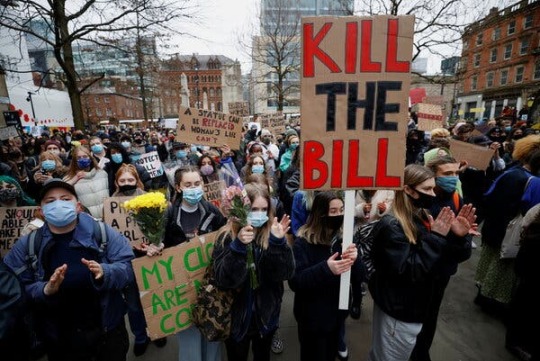
Online forms of protest entail three forms- petitions, boycotts, and written letters (Earl, 2006). Online petitions have been said to be significant sources of activism, especially when it comes to controversial matters (Earl, 2006). For example, after the emergence of the Party Gate scandal, there were several petitions being shared on social media to ask Prime Minister Boris Johnson to step down after lying to the Parliament and to the country about holding parties during coronavirus lockdowns. Likewise, boycotts have long been attributed as a traditional form of social movement (Earl, 2006). A digital spin on boycott means not having any relation with the accused for a period of time (Earl, 2006). In other words, this could refer to not purchasing products of a company or not coming to work (during lockdown when it was working from home). Written letters refer to letters, which are typed on computers, and emailing it to the concerned individual/department/company by informing them about your concerns, displeasure, or expectations.
However, the pandemic exposed the prevalent digital divide in our society (Elliott & Earl, 2016). The distinction between the haves and have-nots is not only based on their levels of income but the extent to which the internet is accessible to such communities and groups (Elliott & Earl, 2016). Furthermore, the digital divide is also related to a lack of digital literacy and skills amongst certain groups of people (Elliott & Earl, 2016). Scholars firmly believe that the internet is essential to build up social and political engagement to bring the change the protests aim at (Elliott & Earl, 2016). More the time we take to fix the issue of the digital divide, the lower the essence of such protests will be (Elliott & Earl, 2016).

The Government’s decision to introduce Online Safety Bill (Woodhouse, 2021) is believed to further deteriorate the levels of confidence protesters would have withholding protests online. Although this bill aims to protect children from harmful content and prevent misinformation and disinformation to spread, it can also be seen as which imposes restrictions on one’s freedom of expression. This is especially in regards to how Ofcom would be given greater powers by the Government under this bill, making some question would that rather perhaps provide the Government greater control over digital media outlets. Thus, Rusbridger’s (2019) argument over politicians regaining control over ways to present information and ‘truth’ gets reinforced under the proposed Bill (Rusbridger, 2019).
To conclude, while technology has compelled us to think about innovative ways to do things differently when it comes to holding protests it still remains quite uncertain. Hence, the digital divide and the Online Safety Bill present challenges to ways we can gain confidence to hold protests on digital platforms.
Bibliography
Davies, C., & Gayle, D. (2022). ‘Kill the bill’ protests: new legislation is proportionate, says Buckland. the Guardian. Retrieved 27 May 2022, from https://www.theguardian.com/law/2022/jan/17/kill-the-bill-protests-new-legislation-proportionate-robert-buckland.
Earl, J. (2006). Pursuing Social Change Online. Social Science Computer Review, 24(3), 362-377. https://doi.org/10.1177/0894439305284627
Elliott, T., & Earl, J. (2016). Online protest participation and the digital divide: Modeling the effect of the digital divide on online petition-signing. New Media &Amp; Society, 20(2), 698-719. https://doi.org/10.1177/1461444816669159
Rusbridger,A. (2019). Breaking News: The Remaking of Journalism and Why It Matters. Canongate Books.
Van Laer, J. (2010). Activists Online and Offline: The Internet as an Information Channel for Protest Demonstrations. Mobilization: An International Quarterly, 15(3), 347-366. https://doi.org/10.17813/maiq.15.3.8028585100245801
Woodhouse, J. (2021). Regulating Online Harms (Report no. 8743). Retrieved from https://commonslibrary.parliament.uk/research-briefings/cbp-8743/
0 notes
Text
The UK government has introduced a new bill which will put limitations on protests as well as increase the ability to prosecute protesters and lengthen prison time.
Look up the PCSC bill.
The government is using this bill as a way to silence dissenters. Some groups are already stating this could be a human right infringement as it could impact the right to assembly and association.
This is bad.
390 notes
·
View notes
Text

KILL THE BILL!
84 notes
·
View notes
Text
The Police, Crime, Sentencing and Courts Bill has passed a second reading.
It has not yet become law but this doesn’t mean we should relax, due to a large tory majority the second reading passed 359 votes to 263. Every single conservative MP bar two, who merely abstained, voted for it. No other party supported the bill.
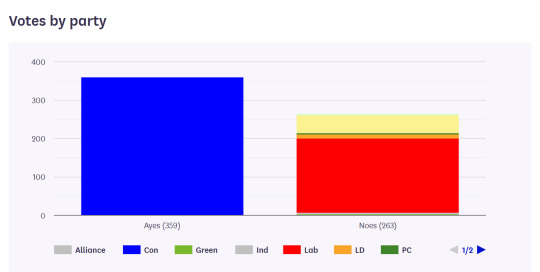
It does more than just attack the right to protest in England and Wales:
Strengthen police powers to tackle non-violent protests that have a significant disruptive effect on the public or on access to Parliament
Including it becoming a crime to fail to follow restrictions the protesters "ought" to have known about, even if they have not received a direct order from an officer.
New court orders to help crack down on knife crime and make it easier for police to stop and search those they suspect of carrying a knife
This will likely lead to even more racial profiling
Tougher punishments for the criminal damage of a memorial, with the maximum penalty set to increase from three months to 10 years
This is directly in response to the George Floyd protests targeting statues of slave traders and colonialists in the summer of 2020
Strengthen police powers to tackle unauthorised encampments that significant interfere with a person’s or community’s ability to make use of the land
This will be likely used to further target traveller families and communities
Doubling the maximum sentence for assaulting [a police officer] from 12 months to 2 years.
Enshrining the police covenant in law.
This is part of a larger move to give the police more power including:
a £1.1 billion increase in funding
20,000 more officers
Expanding stop and search powers to more officers
Increasing the number of stop and searches
I urge you to look into protests happening near you through local organisers on social media
Know your rights before going to a protest even if you do not expect to be arrested
Don’t share photos or videos where protestors can be identified
Sign this petition for maintaining the rights to peaceful protests
#uk politics#kill the bill#reworked my old post in light of calls to action#and more info and more sources#pcsc bill#police bill#british politics#uk protest#if you think anything needs changing/updating or whatever let me know :^)
45 notes
·
View notes
Text



11 notes
·
View notes
Text

Arrests today in London.
By the sounds of it, none of these people had actually *done* anything.
Britain, the police state.
PS Green and black cross are putting out urgent calls for post arrest support, contact them on twitter if you can help.
946 notes
·
View notes
Text
Updating this carrd daily with organisations, actions and information surrounding the ongoing Police Crackdown Bill Protests.
#kill the bill#uk politics#bristol#uk police crackdown#pcsc bill#sarah everard#sisters uncut#please reblog#important#antiziganism#police brutality tw#racism tw#reference#blm#right to protest
11 notes
·
View notes
Video
youtube
Bristol protest against the PCSC bill, March 23 2021
0 notes
Text
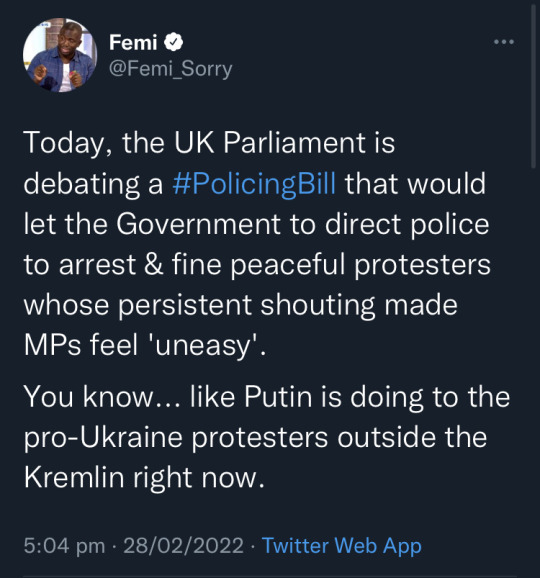

Just a reminder that while the terrible events in Ukraine dominate our headlines, the U.K. government is taking advantage to push through some really shitty things without proper public scrutiny.
So far they’ve let Douglas Ross MP off with no punishment for undeclared warnings of £10,745. Pritti Patel is contemplating a 10 year sentence for people who break the new laws set out by the Policing Bill - a bill that will make it harder for us to lawfully protest.

The Policing Bill is terrifying, and we should be watching closely what happens in the next few days.
For those unfamiliar, here is a summary by the Good Law Project:
The PCSC Bill seeks to make the first major changes to the Public Order Act 1986 since 2003.
As drafted, the Bill represents a serious threat to the right to protest. The provisions threaten to neuter protests in ways that would render them ineffective – effectively taking away one of the only ways in which people can express their dissatisfaction in a democratic society.
The Bill renders the UK an outlier when it comes to international human rights norms around the right to peaceful assembly.
The Minister for Policing promised last summer [2020] in Parliament that the right to peaceful protest “will never be curtailed by this government”. However, this Bill attempts to do precisely that.
Our view is that these provisions in the PSCS Bill should be dropped. But, given their importance to the functioning of democracy, if they are to be considered, it should be carefully rather than being rushed through on an expedited timetable in the middle of a pandemic.
Be afraid. Because our democracy and basic human rights are under threat right now from a government that would capitalise on the invasion of another country to distract us from the fact.
#policing bill#protest#right to protest#uk news#uk law#uk politics#the good law project#good law project#douglas ross#priti patel#liz truss#bojo the clown#boris johnson#tories#conservative party#human rights#racisim#racial profiling#gypsies
89 notes
·
View notes
Photo
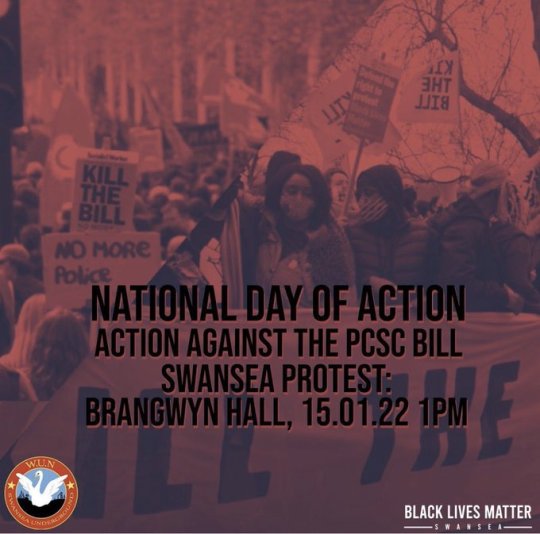
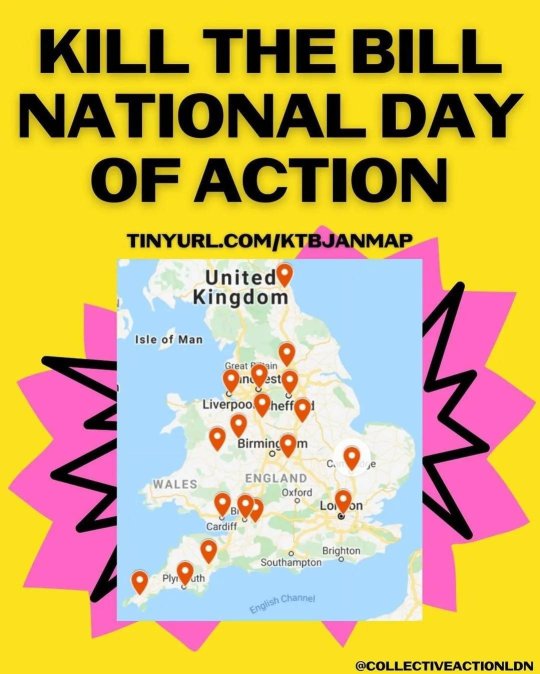

Today is Kill the Bill National Day of Action, with protests at Cardiff, Swansea and Newtown in Wales.
The PCSC Bill will criminalise Roma and Travellers’ rights and protests, which will affect all minoritized people’s right to protests for our own rights.
Stand up against it today at your nearest protest or see other ways you can stand up from Kill the Bill’s official pages: Kill the Bill Official.
#kill the bill#black lives matter#welsh underground network#cardiff#swansea#newtown#m#I don't know as much about the newtown protest as I haven't seen much about it online though#it's at 12pm I think while Swansea and Cardiff at 1pm#if you can't attend a protest of course you can contact your mp's and do other things so see the official pages
86 notes
·
View notes
Text
Police breached “fundamental rights” at a vigil for Sarah Everard and “Kill the Bill” protests, a parliamentary inquiry has found.
There were “multiple failings” by the Metropolitan Police and Avon and Somerset Police in the way they handled events at Clapham Common, south-west London and in Bristol in March, according to the All Party Parliamentary Group on Democracy and the Constitution (APPGDC).
The group of MPs and peers has proposed amendments to the Police, Crime, Sentencing and Courts Bill (PCSC), which is due to be debated on Monday, as a result of the findings.
Inquiry chairman, the Labour MP Geraint Davies, said the right to peaceful protest “must be supported not suppressed by the law”, adding: “The police must not become the enforcement agency of the state against those who choose to publicly and collectively call for change – political, economic, social or environmental.
“Parliament must protect our freedoms and reject attempts to increase police power and restrict our right to peaceful protest. The police should help to facilitate the expression of peaceful protest and not drive opposition underground.”
The report comes after student Patsy Stevenson, who was arrested at the vigil, said she is preparing to start legal action against the Met if it does not withdraw a fine she was issued.
Scotland Yard faced a barrage of criticism, including calls for Commissioner Dame Cressida Dick to resign, after protesters were bundled to the ground and arrested after gathering in memory of 33-year-old Ms Everard, who was killed after disappearing while walking home.
An official report from police watchdog Her Majesty’s Inspectorate of Constabulary and Fire and Rescue Services (HMICFRS) backed the Met’s handling of the event and found no evidence of heavy-handedness.
But it hit out at the force’s “tone deaf” response to criticism of the way it dealt with protesters, saying it should have taken a more conciliatory approach.
The Kill the Bill protest in Bristol – against Government plans to give police sweeping powers to control demonstrations – started peacefully but hours later turned into a riot when around 500 people marched on Bridewell police station, set fire to police vehicles and attacked the building. Later protests also ended with clashes between activists and officers.
Both police forces wrongly applied lockdown laws and their “failure to give transparency and clarity about how they would enforce the regulations in respect of peaceful protest also breached fundamental rights”, according to the parliamentary group’s findings.
The forces “failed to understand their legal duties in respect of protest” and “failed to conduct a proper assessment of the proportionality of their actions”.
The Met “increased the risk to both officers and civilians” by failing to work with the proposed organisers of the vigil, to facilitate a planned and safe event – which “created the conditions for their later enforcement intervention”. Covid-19 risks were not considered and taking action “may have increased the risk of Covid-19 transmission at the vigil.”
Avon and Somerset officers “faced real violence but failed to distinguish between those protesting peacefully and those engaged in acts of violence” and used “excessive force against peaceful protestors”.
HMICFRS inspectors were also criticised for appearing not to take into account testimony from people at the vigil in its review – something described as a “significant failing” by the parliamentary group which said made it “impossible” to give the watchdog’s findings “full weight.”
But the report acknowledged police were put in “difficult situations” due to the “ambiguity” of coronavirus rules.
Scrapping new proposed powers to limit the right to peaceful demonstrations has been suggested as an amendment to the Bill, alongside a code for policing protests.
The findings deemed new proposed powers “unnecessary” and found they placed police in an “unfair position” as officers will “be able to decide if protests go ahead and under what conditions”, eroding the “legitimacy of the police as a non-political service”.
The code would place a “duty” on police to facilitate peaceful protest and allow people to bring legal action against forces if breached, the report added.
The Government said public order laws were out of date and the measures proposed in the Bill would “in no way curtail on the right to peaceful protest” but instead allow officers to “better manage demonstrations so that legitimate protest groups can make their voices heard without disrupting the lives and livelihoods of others”.
The HMICFRS rejected the comments made about the watchdog.
A spokeswoman said: “We spoke to several members of the public who attended the vigil, and we interviewed the Reclaim These Streets organisers, police officers, politicians and officials in central and local government. We also reviewed hours of body-worn video from police officers at the vigil and other media.
“We are an independent inspectorate and all of our inspections, like this one, are objective and based on robust evidence.”
In a statement, Avon and Somerset Police said: “We always welcome transparency and accountability but we strongly refute some of the findings of this report relating to the policing of protests in Bristol.
“During the period the report covers, the law was not sufficiently clear as to whether peaceful protest was lawful under Covid-19 regulations and all forces were interpreting them as best as they were able to.
“We reject any suggestion we did not facilitate peaceful demonstrations on the day of the riot and for subsequent protests.
“We made repeated attempts to engage with organisers before each event and in the majority of cases, no-one identified themselves as being in that role.
“When the events took place, on each occasion protesters were provided with ample opportunity to make their voices heard before officers gave clear directions for them to disperse.
“We absolutely recognised their right to peaceful protest but we had to balance the significant risk to public health, taking into consideration the regulations in place at the time, and the rights of the wider public to go about their daily lives without disruption.”
The statement added: “Complaints around disproportionate or excessive force relating to the use of shield strikes have been fully investigated by our Professional Standards Department (PSD) and the complaints have not been upheld and we utterly reject the report’s suggestion that this use of force ‘may amount to criminal offences’.”
Assistant Commissioner Louisa Rolfe, from the Metropolitan Police Service, said: “Following the Sarah Everard vigil on Clapham Common, Her Majesty’s Inspector of Constabulary conducted a thorough review of the policing response, examining in detail the actions of officers both before and during the vigil.
“That report made it clear that police officers acted proportionately and did their very best to peacefully disperse the gathering, demonstrating patience and restraint. HMICFRS also examined the detailed considerations officers gave to the law, specifically the right to protest in the context of the coronavirus regulations which were introduced by Parliament. HMICFRS concluded that officers adopted a lawful approach in their application of the regulations, both before and during the vigil.
“I stand by the actions of those officers who policed the events on Clapham Common. Those officers were met with an extraordinarily challenging circumstance and demonstrated the highest degree of professionalism in their engagement with those gathering. Officers followed national guidance on the policing of the coronavirus regulations, only taking enforcement action as a very last resort.”
Bolding for emphasis my own.
16 notes
·
View notes